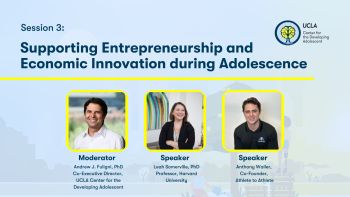At the 2022 American Psychological Association (APA) Science Summit, National Scientific Council on Adolescence (NSCA) member Dr. Candice Odgers joined a panel of experts, including U.S. Surgeon General Dr. Vivek Murthy and APA president Dr. Mitch Prinstein, to talk with moderator Soledad O’Brien about youth mental health and digital tech use.
Supporting youth as they navigate the benefits and risks of social media is crucial to influencing youth mental and wellbeing in a positive way. “They’re [youth] looking at it and recognizing that they’re tethered to something which sometimes makes them feel worse,” said Dr. Murthy. “That’s not to say that there aren’t some benefits to social media. There are some kids who have found communities online, and that’s been very powerful for them.”
Despite rampant fears over social media use, research paints a more nuanced picture. “We hear a lot of fears about what might be happening,” said Candice, “but I think we really need to drill down and understand what IS happening and how they’re impacted.”
In fact, many young people have positive experiences online. “They’re following people that are aligned with them in terms of their values, their culture, their religion, maybe their body type,” said Candice.
Additionally, youth are using social media as a means for locating mental health resources. “I think one of the most surprising things for me has been hearing from young people about the amount of times they go online to find out information about mental health themselves,” said Candice. Dr. Odgers. “Kids are actually seeking help for mental health problems online.”
Adults can help youth amplify the positive aspects of social media. And the early adolescent period—approximately 9- to 12-years-old—is where we should be focusing our efforts to help young people develop a healthy relationship with technology, she said.
“We spend so much time as parents and researcher counting the hours instead of asking, what are they doing? Why are they there? What do they need?” said Candice.
Candice and Mitch offered suggestions for what parents can do to amplify the benefits and decrease the risks of digital technology use for young people:
- View social media usage from a holistic perspective. Instead of only counting time spent on screens, ask youth what they’re doing, why they’re online, and what they need.
- Engage young people in conversation about tech use. Help youth process the information the encounter online by talking about what they see and why they think people choose to post or share certain information.
- If you have time, go into those online spaces with them. Parents can understand more about young people’s experiences by playing Fortnite together, for example.
- Pay attention to all of the factors that impact wellbeing. Sleep, friends, school, and support all impact youth mental health and wellbeing–make sure you are paying attention to those factors in addition to social media usage.
- Encourage mindful social media use. Help young people be intentional about using technology by considering what they want to do and how long they expect to be online before they log on.
- Limit screen time at night to protect sleep.
- Model the behavior you want to see. Monitor your own screen time usage. Your habits are a model for the young people in your life!
Even with these suggestions, parents’ influence over young people’s online experiences in limited.
“Too much responsibility is placed on parents,” said Candice. “Social media companies and platforms have a responsibility to do some of that safeguarding in terms of content.”
Candice pointed out that young people spend more time in digital spaces than in schools in a given week. We invest a lot in ensuring that schools are safe, productive places to be, she said, and we can do the same for digital technology.
For example, technology companies should have mental health experts embedded into their organizations to ensure that their platforms are safe for young adolescents, who are some of their biggest users. These organizations should help support training programs in schools to teach kids about data sharing and how to navigate harmful messages on social media.
“These social media companies, and these devices, they’re brilliant,” said Mitch. “In the span of 10 years, look what’s happened to our entire world? Now, imagine you harness that for good.”

_770_371_80_c1.jpg)

